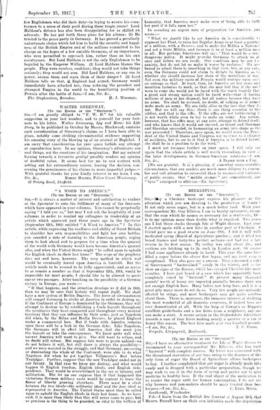BEEKEEPING.
[To THE EDITOR OF THE " SPRETAPOR."1 Stn,-16ey a Cheshire beekeeper express his pleasure at the attention which you are drawing to the production of honey ? It not only saves sugar, but is a much better food. With your correspondent Mr. Guy Elliston I ant in hearty agreement, except that the sum which he names as necessary for a start—viz., 2t— is in my opinion more than double what is required. Two years ago I lost three stocks through Isle of Wight disease. Last year I started again with a new hire in another part of Cheshire. A friend gave me a good swarm on June 19th. I fed it well with medicated syrup (Board of Agriculture powders), and it filled ten brood frames and forty-two perfect sections—not bad for a Lite swarm in its first season. My outlay was only about _Ss.. and sections are fetching up to Is. each in London now. Of course I had some appliances already in band. This year the same Idle filled a super before the clover flow began, and any fruit crop is exceptional. They also gave me a swarm. They consumed a cake of Government " bacterolized " candy in the minter, and so far show uo signs of the disease, which has ravaged Cheshire like most counties. I hare just heard of a case which has apparently been completely cured by "bacterol." AL present many thoasaul pounds' worth of honey are imported annually because there are not enough English bees. Many ladies now keep bees, and it is a great pity messy more do not do so. Very few people are seriously affected by stings, and most beekeepers soon get quite careless about them. There is, moreover, the immense interest of studying the most wonderful of all domestic creatures, if indeed bees are ever domesticated at all. With the help of Cowan's or Digger's excellent guide-books and a few hints Cram a neighbour, any ono can make a start. A recent article in the Staffordshire Adrertiser records a case of four hives making nearly a quarter of a ton of honey this season. The best hire made over two hundred pounds.
—I am, Sir, &c., T. F. Rorer. theynfa, Lltrynywril,


























 Previous page
Previous page